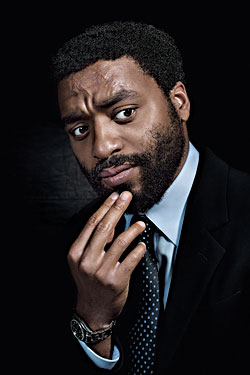
Chiwetel Ejiofor exudes a poise so perfect that it is almost uncanny. For English speakers, his Nigerian name is a stumbling block that requires a pronunciation code (“Chew-eh-tell Edge-ee-oh-for”), but Ejiofor never considered trading it in for something blander. “I never actually decided to keep my name,” says Ejiofor. “I started in theater, and nobody mentioned it. I just carried on working. Then my first role in films was Amistad, and I was only 19.” (Contrary to press reports, he does not go by the nickname Chewy.) Now 33, Ejiofor has worked with many of the world’s greatest directors—Woody Allen, Stephen Frears, Spike Lee—and is touted as Britain’s “first genuine black movie star” as well as a stage actor whose Othello at the Donmar Warehouse was the talk of London last winter. Off the set, he is patient and courteous, with a softly modulated voice that makes even the simplest sentence ring.
So naturally he’s working with David Mamet, the prince of foulmouthed dialogue and unchecked personal aggression. Who has made a martial-arts action movie, inspired by five years of jujitsu training that earned him a purple belt. Mamet’s tenth film as writer- director, Redbelt, is, in his description, an “American samurai movie” about Mike Terry, a Gulf War vet who owns a Los Angeles academy that teaches Brazilian jujitsu and its strict code of ethics. Ejiofor brings a muscular stillness and deliberate delivery to the role; Terry’s the kind of guy who asks no questions when a distraught woman walks into his school, grabs an off-duty cop’s gun, and fires a bullet through the storefront window. He has no money to fix it, his va-va-voom Brazilian wife borrows $30,000 from a loan shark, his cop student could lose his job for not reporting the incident—Terry sees each step as a debt of honor to be paid. “People who are not inclined to do things that will make them richer immediately find themselves in conflict with the world, which is geared to that purpose,” says Ejiofor. “Through just his ideology, Mike can run into a sense of alienation.”
Unlike the typical Mamet hero, Ejiofor’s character eschews obscenity for mantralike calmness—“Administer the fight. Administer the fight. Insist. Insist”—without sounding like Mr. Miyagi. Terry administers the fight not with language but with his hands—and feet, the knife you pulled on him, a cane, and the occasional bar stool. (Ejiofor is quick to admit he’s no fighter: “I couldn’t use the martial arts in life. With choreography, there’s not the fog of war.”) Ejiofor’s timing is so careful and unhurried that he seems set to a slower speed than the oily fight promoters and Hollywood insiders surrounding him onscreen. The Mamet patter is present, but mostly in the form of taunts that Ejiofor registers in silence. Like Lucifer in Paradise Lost, the bad guys get all the choice lines.
For Redbelt, Ejiofor—an actor known for elaborate preparation before he steps into a role—spent five months training at the Roger Gracie academy in London and with Renato Magno in L.A., and found his way into the character, he says, through physicality. “For this film, a detailed analysis of Mike Terry’s early life would not have helped as much as understanding the philosophy of jujitsu. After a few weeks of training intensely, you start to understand these guys—how the way a person lives his life influences the way he fights. Somehow, in film, that stoic character hasn’t been very available recently. It’s not considered filmy. The tangled antihero is more popular.”
That’s a character Ejiofor mastered in his previous role, as Othello to Ewan McGregor’s Iago. In March, he beat out Ian McKellan and Patrick Stewart to win London’s Olivier award for Best Actor. Referring to his “charismatic Othello” became a cliché, which the Evening Standard avoided by referring to his “charismatic eyes,” and ticket prices surpassed $2,000 online. Now there are rumblings about bringing the production to Broadway, which Ejiofor would be “very happy” to see happen. Technically, Ejiofor has played for an American audience before, some fifteen years ago, and he remembers the experience fondly. “The first time I was in America was a high-school exchange with the Latin School in Chicago. I was doing something very British—The Importance of Being Earnest, by Oscar Wilde. I remember we got a standing ovation, and I was very excited because standing ovations are very rare in Great Britain. But then I found out standing ovations are pretty common here.”